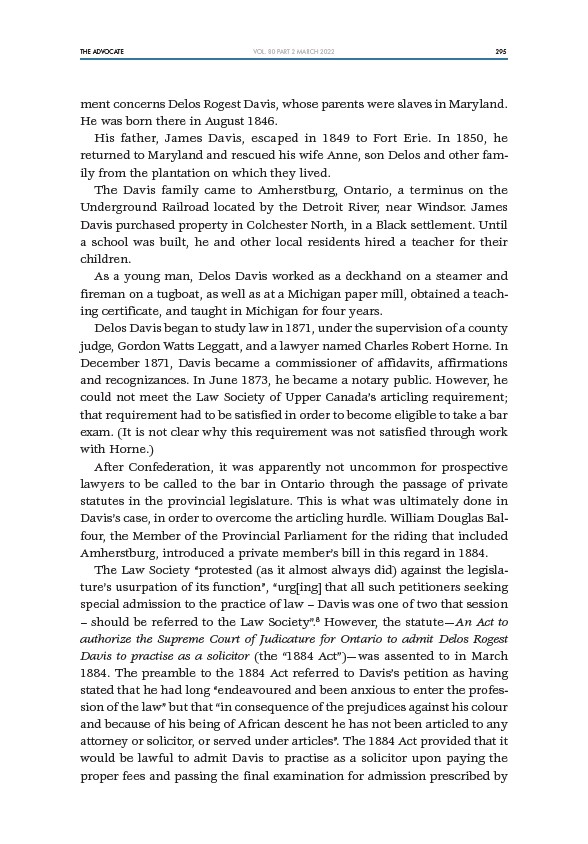
THE ADVOCATE 295
VOL. 80 PART 2 MARCH 2022
ment concerns Delos Rogest Davis, whose parents were slaves in Maryland.
He was born there in August 1846.
His father, James Davis, escaped in 1849 to Fort Erie. In 1850, he
returned to Maryland and rescued his wife Anne, son Delos and other family
from the plantation on which they lived.
The Davis family came to Amherstburg, Ontario, a terminus on the
Underground Railroad located by the Detroit River, near Windsor. James
Davis purchased property in Colchester North, in a Black settlement. Until
a school was built, he and other local residents hired a teacher for their
children.
As a young man, Delos Davis worked as a deckhand on a steamer and
fireman on a tugboat, as well as at a Michigan paper mill, obtained a teaching
certificate, and taught in Michigan for four years.
Delos Davis began to study law in 1871, under the supervision of a county
judge, Gordon Watts Leggatt, and a lawyer named Charles Robert Horne. In
December 1871, Davis became a commissioner of affidavits, affirmations
and recognizances. In June 1873, he became a notary public. However, he
could not meet the Law Society of Upper Canada’s articling requirement;
that requirement had to be satisfied in order to become eligible to take a bar
exam. (It is not clear why this requirement was not satisfied through work
with Horne.)
After Confederation, it was apparently not uncommon for prospective
lawyers to be called to the bar in Ontario through the passage of private
statutes in the provincial legislature. This is what was ultimately done in
Davis’s case, in order to overcome the articling hurdle. William Douglas Balfour,
the Member of the Provincial Parliament for the riding that included
Amherstburg, introduced a private member’s bill in this regard in 1884.
The Law Society “protested (as it almost always did) against the legislature’s
usurpation of its function”, “urging that all such petitioners seeking
special admission to the practice of law – Davis was one of two that session
– should be referred to the Law Society”.8 However, the statute—An Act to
authorize the Supreme Court of Judicature for Ontario to admit Delos Rogest
Davis to practise as a solicitor (the “1884 Act”)—was assented to in March
1884. The preamble to the 1884 Act referred to Davis’s petition as having
stated that he had long “endeavoured and been anxious to enter the profession
of the law” but that “in consequence of the prejudices against his colour
and because of his being of African descent he has not been articled to any
attorney or solicitor, or served under articles”. The 1884 Act provided that it
would be lawful to admit Davis to practise as a solicitor upon paying the
proper fees and passing the final examination for admission prescribed by